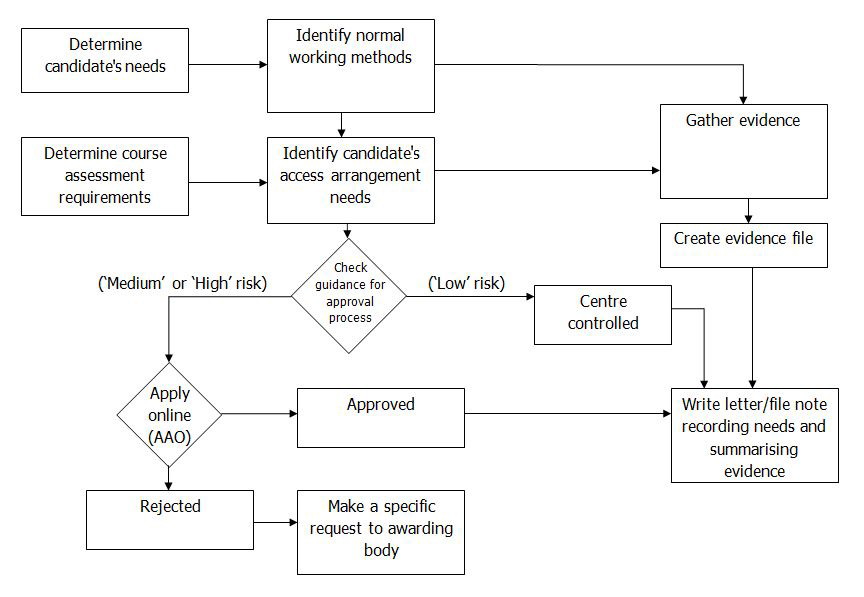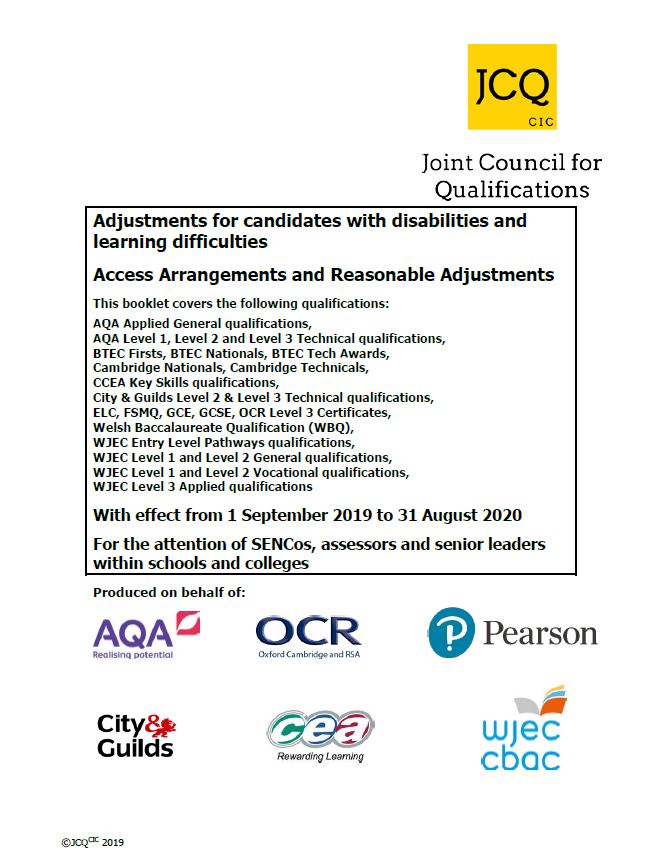- Whatever the access arrangement, for any adjustment, a clear case needs to be made and supporting evidence has to be available.
- The main access arrangements available are set out in the JCQ guidance.
- The majority of arrangements must be applied for using the 'Access Arrangements Online' (AAO) tool.
- A rejection by the AAO does not mean that the arrangement is not possible, but further discussion with the Awarding Organisation is required before it can be approved.
- You should refer to the JCQ website for the specific dates and deadlines.
- An exemption adjustment is only considered if there is no access arrangement available which can provide access to the assessment.
In this activity you will look at the main types of access arrangements and how they may be requested.
The details of individual access arrangements will be dealt with later, in the unit 'Access arrangements for candidates'.
The main access arrangements available are set out in the JCQ guidance 'Adjustments for candidates with disabilities and learning difficulties, Access Arrangements and reasonable adjustments' (refer to the ).
The document can be downloaded from the JCQ website.
Frequently used access arrangements
The process for using an access arrangement will depend on the nature of the arrangement needed.
The arrangements are described in the JCQ guidance along with the process for approval and the kind of evidence required.
Here are some of the access arrangements most frequently used by candidates with sensory impairment.
Please note that, with effect from 1 September 2018, JCQ has renamed 'Sign Language Interpreter' as 'Communication Professional' and with effect from 1 September 2019, JCQ has renamed 'Oral Language Modifier' as 'Language Modifier'.
- Extra time up to 25%
- Extra time more than 25%
- Supervised rest breaks
- Technology
- Modified paper in 'standard format' (VI only)
- Individually modified paper
- Language Modifier
- Communication Professional
- Listening tests in MFL
- Music
- Spoken language endorsement
- Readers/computer readers
- Scribes
- Electronic papers
- Readers/computer readers
- Practical assistant
- Separate accommodation
- Transcripts
The ways in which the various access arrangements are requested and approved can be characterised as follows:
- no need for external approval
- request approval using the online tool and get an automated decision
- request approval using the online tool but undertake further detailed discussion with the Awarding Organisation concerned
Although not described in these terms in the JCQ guidance, the types of arrangements and the way they are requested and approved fall into three categories, which relate to the risk to the integrity of assessment.
- Low risk
- Medium risk
- High risk
Select the buttons to find out more about the types of arrangements and the approvals needed.
The feedback will appear after the reveal button.
Have a go at categorising the following access arrangements as low, medium or high risk. You should make your decision based on their use in most exams — there may be specific subjects where a different rule applies.
Move each item into the appropriate category. Drag each item or select an item and then select its destination.
Select this link for a text version of this activity.
The feedback will appear directly after the check response button.
Needs and evidence
Having identified the candidate's needs and determined the adjustments that are needed for the candidate, the centre should seek the appropriate level of approval.
The JCQ guidance identifies the common adjustments and describes the process for approval for each one along with the required evidence and the need for any specific forms to be completed.

Flowchart description
The flowchart summarises the actions involved in requesting access arrangements.
1 Determine the candidate's needs and identify his/her normal working methods
2 Determine the course assessment requirements
3 Using 1 and 2, identify the candidate's access arrangement needs
4 Check the approval process for each of the candidate's access arrangement needs; if Low risk then it is centre controlled, if medium or high risk then apply online using the AAO
If the online application is rejected (ie high risk) then make a specific request to the awarding body
5 For all arrangements whether they are centre controlled, approved online or approved after consultation with the awarding body; record the needs, record the arrangements and summarise the evidence
The JCQ guidance is not exhaustive, in that access arrangements not listed may be permitted in individual cases through discussion with the relevant Awarding Organisation (where they are deemed to be a reasonable adjustment for an individual candidate).
In all instances a clear case needs to be made and supporting evidence has to be available.
Applying online
For most arrangements the centre will need to make an online application using the Access arrangements online (AAO) tool. The tool is accessed using a secure login that is available to approved exam centres. Access is also available through the awarding body sites.
Many arrangements ('medium risk') may be automatically approved by the AAO online service.
Some arrangements ('high risk') will be automatically rejected by AAO even though they are described in the guidance, for example 'Extra time between 25% and 50%'. The online application is nevertheless, a necessary part of the process.
The rejection does not mean that the arrangement is not possible, but further discussion with the Awarding Organisation is required before it can be approved. This process takes place off line.
Requests
Access arrangements may only be requested by the examination centre. The JCQ does not deal with requests from parents or carers.
Timetable
The procedures for creating and modifying papers and giving approvals for access arrangements is lengthy and so the timetable for requesting arrangements begins well in advance of the examinations.
You should refer to the for the specific dates and deadlines relating to access arrangements.
The JCQ website also provides detailed information on the examination cycle.
Below is a rough indication of the calendar for examinations from the perspective of the centre (eg school) based on a June examination series for GCSE.
Explore the timeline to see what the centre's examination office should be considering at various points during the calendar. Select the various parts or use the 'next' button to identify the approximate timing of various events.
Select this link for a text version of this activity.

Select 'next' or explore the diagram to see information about preparing for examinations.
The feedback from using the 'next' button will appear in the text box above.
Last resort
Under the Equality Act, a candidate with a disability taking General Qualifications may be exempted from a whole component of a qualification as a very last resort if:
- there is no access arrangement available which can provide access to the assessment
- the candidate is unable to fulfil any of the requirements of that component
- the exempted component makes up no more than 40% of the qualification.
Result
Where an exemption is granted the candidate's grades will be enhanced, i.e. the marks gained in sections of the assessment which have been taken will be increased proportionally to make up for lost marks. However, candidates should be aware that an 'indication' may be placed on their certificate stating that it was not possible to make the full assessment accessible to them.
Frequency
Exemptions are used very rarely and require detailed discussion with the Awarding Organisation concerned.
